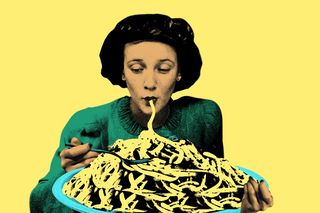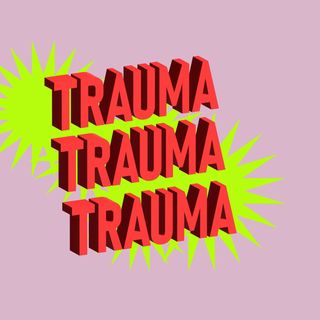
Is This Normal? ‘I Can’t Do Anything in Moderation’
Dubbed as extreme behavior, being unable to function in moderation is considered a form of cognitive distortion in the brain.

In this series, we dig into our strange phobias, fixations, and neuroses, and ask ourselves — Is This Normal?
I cannot do anything in moderation. When I’m at parties, I either abstain from alcohol or binge drink. Eating in moderation, too, isn’t something I can do — I can either give up eating fries completely or order them every other day till I grow to resent their taste and texture. I don’t understand how people are able to watch a show they love for months on end. If I love a show — no matter how long the episodes are or how many seasons it has — I cannot rest till I’ve finished it. Unfortunately, this attitude extends into my professional sphere, too — I oscillate between not being able to work at all despite having my laptop open before me, and working for hours on end, forgetting even to eat and hydrate while I’m caught in hyperfocus mode.
Is this normal? Not always. But, is it common? Yes, indeed.
Moderation is a virtue often missing among those caught in an all-or-nothing mindset. Indeed, “everything in moderation’ isn’t a lesson everyone can follow. Dubbed as extreme behavior, being unable to function in moderation — be it with eating, drinking, exercising, working, shopping, what have you — is considered a form of cognitive distortion in the brain. A reflection of black-and-white thinking, it is common among neurodivergent people, and those living with anxiety, depression, suicidal ideation, and eating disorders. But it’s a propensity that many others have too, because of how human psychology intersects with culture. “We live in an addictogenic culture,” Dr. Andrew Parker, a consultant psychiatrist at London’s Nightingale Hospital, told Refinery29, adding, “Bad habits are very often more immediately attractive, exciting, pleasurable and comforting.” There’s thus a bigger question to ask about why we value moderation so much — is it even worth it?
Doing too much of everything can indeed be addictive — indicating why people who are prone to binging aren’t able to switch to an in-between lifestyle with ease. Overindulging — be it in food, shopping, or drinking — can feel amazing because it causes our brains to release staggering quantities of the feel-good neurotransmitter, dopamine. Soon enough, we begin to crave the same rush, leading us to get caught in the binge web. If it feels so good, moderation could perhaps feel like the unhappier lifestyle choice.
Some may argue that it’s about moderation in terms of frequency, rather than quantity. Most people binge-watch, and many people go overboard with drinks and pizza. It only starts to become a problem, then, when these happen often enough to interfere with someone’s life. But others would say: there’s nothing wrong with not living a life of moderation at all. When it comes to lifestyle patterns, many individuals have work, sleep, or activity schedules that are all-or-nothing — and they make it work perfectly well.
Related on The Swaddle:
Perhaps, it is my autism — commonly associated with the black-and-white thinking style — that informs my attitude toward this. As Callum Stephen, an autistic content creator, wrote: “I either give 100% or 0%… [when] I’m too tired to give my all, I give nothing at all.” This statement also reflects an obsession with perfectionism that often stems from ADHD, a diagnosis that both Stephen and I appear to share.
Not having an in-between might also be connected to people’s struggle with impulse control — another trait that’s frequently observed among neurodivergent individuals, among others. “I find it far easier to give something up altogether than to indulge moderately. When I admitted to myself that I was eating my favorite frozen yogurt treat very often — two and even three times a day — I gave it up cold turkey. That was far easier for me to do than to eat it twice a week… If I never do something, it requires no self-control for me; if I do something sometimes, it requires enormous self-control,” Gretchen Rubin, an American author, had once written.
Not being able to do things in moderation, however, isn’t necessarily the precursor to a mental health diagnosis. It doesn’t automatically suggest that one is neurodivergent, either. Everyone struggles with moderation, to some extent. Also, the definition of moderation can vary from person to person. One may prefer to shop for the entire year in one go. Another person might prefer to commit to exercise and intermittent fasting for a couple of weeks every three months, rather than sticking to a diet throughout the year. Yet another person’s way to ensure they regulate their alcohol intake might be to abstain a few times and indulge whole-heartedly, at others.
And, maybe, I don’t even want to do anything in moderation. Instead of accepting “everything in moderation” as the ultimate tenet for a blissful life, perhaps, I perceive it as an unduly glorified principle that doesn’t happen to align with my outlook. I’m not the only one who thinks this way. As writer Chrissy Stockton noted, “I’ll be honest, I don’t like moderation. What is the point of doing something if you only like it enough to do it halfway? I like to stay up all night reading a book because I can’t put it down, or toss it out after the first chapter. My favorite way to listen to my music is to become obsessed with an artist and consume their music until I don’t ever want to listen to it again. I want to experience it wholly and then move on.”
So, the question is: is moderation even worth it? Eh, maybe not.
Devrupa Rakshit is an Associate Editor at The Swaddle. She is a lawyer by education, a poet by accident, a painter by shaukh, and autistic by birth. You can find her on Instagram @devruparakshit.
Related


Words Mean Things: ‘Trauma’
